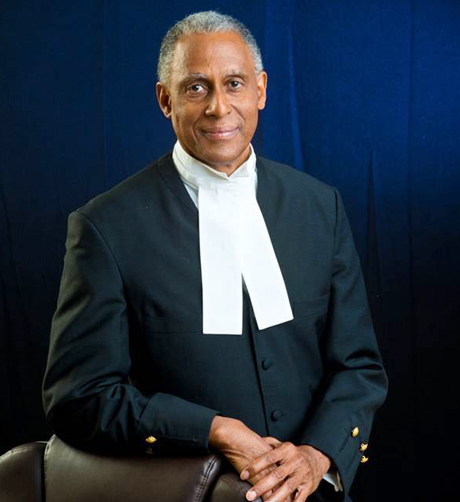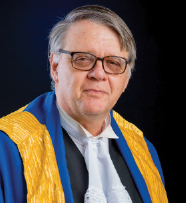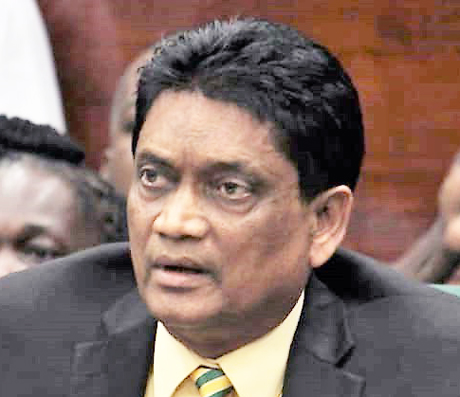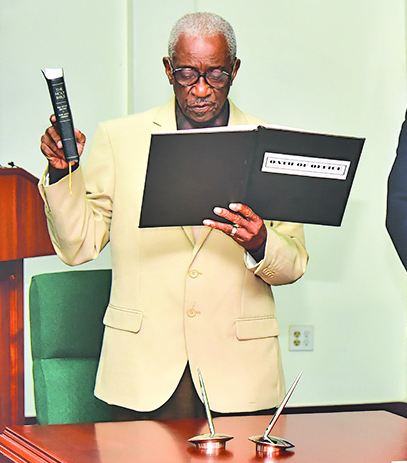properly passed: CCJ

In its ruling today in Trinidad the CCJ affirmed the right of MPs to vote against their lists and threw out arguments related to dual citizenship and the discredited 34-majority argument.
It said that articles 106(6) and 106(7) on the motion of no-confidence had been triggered.
A release from the CCJ follows:
The Caribbean Court of Justice (CCJ) ruled on a trio of cases related to the motion of no confidence that was made in the National Assembly of Guyana on 21 December 2018. In the judgment delivered today, the CCJ declared that the motion of no confidence in the Government is valid. Guyana’s Constitution states that the Cabinet, including the President, is required to resign if the Government is defeated by the majority vote of all the elected members of the National Assembly “on a vote of confidence”. In December 2018, the Leader of the Opposition had moved “a motion of no confidence” in the Government. Mr. Charandas Persaud, a member of the Government, had joined the 32 Opposition members in voting for the motion so that 33 members voted in favour of the motion and 32 voted against.
Another provision of the Constitution required elections to be held within three months of the defeat of the Government on a motion of confidence, unless two-thirds of the National Assembly determined a longer period before the holding of elections. Despite the Speaker of the Assembly declaring that the motion had been validly passed, the Government neither resigned nor announced impending elections. This triggered a number of legal challenges in the courts in Guyana, which ultimately led to two days of hearings at the CCJ in May 2019.
There were three main issues before the Court. The first issue related to the number of votes needed to pass a vote of no-confidence. The CCJ decided that the requirement for “a majority of all the elected members of the National Assembly”, referred to a majority of the total number of votes or seats in the Assembly, irrespective of the number of members who actually vote. In determining that majority, the Court was of the opinion that the ‘half plus one’ rule was not applicable. The Court stated that the majority was clearly at least 33 votes.

Another issue hinged on the differences between a ‘motion of no confidence’ and ‘a motion of confidence’. It was argued that the provisions in the Constitution only applied to ‘motions of confidence’ which could only be raised by a member of the Government. The Court however held that the reference to ‘a vote of confidence’ in the Constitution included ‘a motion of no confidence’ which could be raised by any member of the Assembly, including the Leader of the Opposition.

Mr. Justice Anderson said that there may be need for drafters to revisit the language of ‘confidence motions’ provisions in the Constitution to bring about more clarity. He also said that while challenges to disqualifications for elections were generally barred after 28 days after the election, in his opinion, there may be cases such as fraud where the Court would have jurisdiction to hear the matter. Mme. Justice Rajnauth-Lee in her judgment stated that “there was nothing which prevented Mr Persaud from voting in favour of the no confidence motion” and she urged all to bear in mind that the rule of law was an important guiding constitutional principle of a sovereign democratic state like Guyana.
In the coming days, the Court will hear further arguments from the parties on the consequences that should flow from the validity of the motion of no confidence. The full judgment of the Court, along with a judgment summary, is available on the Court’s website at www.ccj.org.

Port of Spain, Trinidad – The Caribbean Court of Justice (CCJ) Tuesday ruled that the process through which Reverend Justice (Retired) James Patterson was appointed Chairman of the Guyana Elections Commission (GECOM) by His Excellency, Brigadier David Granger, President of Guyana was flawed and in breach of Guyana’s Constitution. The Court emphasized, however, that nothing in its judgment was intended “in the slightest degree” to cast aspersions on Justice Patterson’s competence and suitability for the position of Chairman of GECOM. Nor was there any suggestion that President Granger had not acted in good faith.
The Constitution stated that the Chairman was to be appointed by the President from a list of six persons, not unacceptable to the President, submitted by the Leader of the Opposition. Three lists, with a total of 18 nominees for the post of the GECOM Chairman, were submitted for consideration by the Leader of the Opposition. President Granger rejected the names on all three lists. The first list was rejected as, in the President’s view, the qualifications and experience of the nominees did not seem to conform to the requirements outlined in the Constitution. The second list was rejected by the President, as he found it to be unacceptable within the meaning of the Constitution and the criteria that he had set out in a ‘Statement of Qualities of the Chairman of the GECOM’ that he had submitted to the Leader of the Opposition.
Prior to the submission of the third list, the Government and the Opposition met and consulted on the “way forward on the selection and appointment of the Chairman”. After that meeting, the third list was submitted to the President and rejected as being unacceptable.
After disapproving the third list, the President advised the Leader of the Opposition that he would select a Chairman himself. This course of action is provided for by the Constitution if the Leader of the Opposition failed to present a suitable nominee. The President justified his decision to appoint a Chairman himself in part on the ground that it would not serve the public’s best interest to further delay the appointment.
In determining the main issue in the case, the Court looked first at the proper meaning of Article 161(2) of Guyana’s Constitution. That Article sets out the requirements to be satisfied for a person to be eligible for appointment as GECOM Chairman. It also sets out the general process for selecting the Chairman.
To determine the meaning, the Court looked at the drafting history of Article 161(2), observing that changes had been made to it to promote consensus and inclusiveness by involving the Leader of the Opposition in the selection process. The CCJ also stressed that “an onus is placed on the President not to find a nominee unacceptable merely because the nominee is not a choice the President would have himself made. The President should only find a nominee unacceptable for some good reason on objective grounds”. It was also found that the President could not, as a precondition to considering a nominee, include eligibility requirements that were additional, or different, from those stated in the Constitution.
The Court therefore found that the process was flawed and in breach of the Constitution. In a concurring judgment, Mme. Justice Rajnauth-Lee stated that by giving reasons why nominees are rejected, the President will engender greater public trust and confidence in the Elections Commission. Mr. Justice Anderson, also in a concurring judgment, agreed that the process was flawed but did not think that, at the consultative stage, it was necessary for reasons to be given.
The Court concluded that the most sensible approach to the process of appointing the Chairman of GECOM is for the Leader of the Opposition and the President to communicate with each other in good faith and, perhaps, even meet to discuss eligible candidates for the position of Chairman before a list is submitted formally. The CCJ having concluded that the appointment was in breach of the Constitution, the court invited both sides to present further arguments on how the issue should be rectified.
The full judgment of the Court, and a judgment summary, are available at www.ccj.org.


